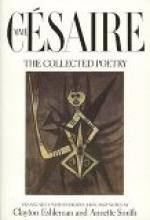|
This section contains 7,853 words (approx. 27 pages at 300 words per page) |

|
SOURCE: Dayan, Joan. “Playing Caliban: Césaire's Tempest.” Arizona Quarterly 48, no. 4 (winter 1992): 125-45.
In the following essay, Dayan examines Césaire's interpretation of Caliban in his A Tempest and differentiates his characterization from Shakespeare's version.
After the Amerindians (Carib, Arawak, Taino, and Siboney), the original inhabitants of the Caribbean, were annihilated, and nothing remained but a blankness waiting to be filled by African slaves, a name would remain. The name alone would stand for all that had been destroyed: “Cannibal” uttered by those who “civilized” the land would live on to justify the extirpation of a race and the conquest of a world. Black slaves, their names forgotten, their pasts obliterated, were renamed in the New World. But no matter their new names, they would, when it served the settlers' purposes, embody the figure of the deformed and language-less savage. Caliban, now defined in most dictionaries as an...
|
This section contains 7,853 words (approx. 27 pages at 300 words per page) |

|


